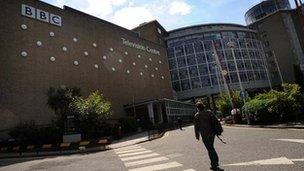BBC 'unambitious' about savings and revenue, MPs say
- Published

MPs said the BBC did not know with confidence if cuts had impacted on quality
The BBC has been "unambitious" about potential savings and plans for increasing revenue, a Commons Public Accounts Committee report says.
MPs on the committee said the BBC had underestimated the scope for efficiency improvements.
It risked undermining public trust in its financial management and openness, their report added.
The BBC said all indications were that it was delivering value for money and ensuring output quality remained high.
The committee's report says the BBC will be in a "weak position" to argue that any future cuts could be damaging.
Committee member Richard Bacon MP said: "It took the pressure of a licence fee settlement to force the BBC into setting a target of 3% annual savings, which it is comfortably on track to achieve. The BBC's assumptions about what it could deliver were unambitious."
The public accounts committee report says the BBC did not prepare a detailed analysis of the costs of its services and their value to licence fee payers when identifying efficiency savings. Such analysis is "vital", it says, and should be based on licence fee payers' feedback.
The report recommends that the broadcaster publish how it expects savings to impact on the quality of its services, the level of impact it will tolerate and how it will respond if those levels are breached.
The BBC Trust said that its 3% target was at "the top end of a range" suggested by the then government, on the advice of the National Audit Office (NAO). It said that it was "encouraging" that the target was being exceeded.
"In a very difficult economic climate, the trust is now pushing for further savings, and we have set a target of 11% efficiency savings by 2017. This has been independently analysed by Ernst & Young," a spokesperson said.
"The trust monitored the implementation of the 3% target, in particular to gauge whether they were true efficiencies and did not impact on the quality or scope of the BBC's services. We will continue to do this for the new target."
In a separate statement, the BBC said: "The NAO report acknowledges that the BBC is achieving a good balance between delivering value for money through the financial savings targets that the BBC Trust has set whilst at the same time ensuring that the quality of the output remains high.
"All indications are that we are delivering on both fronts but we will continue to monitor these targets closely."
Increasing commercial income
The select committee's report also says the corporation should challenge the cost of its services "more vigorously" through greater use of internal benchmarking and measures like researching other broadcasters' costs.
"The BBC's plans for increasing commercial income, from £280m to £320m a year by 2016-17, are unambitious in the context of the financial pressures it faces," it says.
The report says the BBC Trust should "formally revisit" whether the £40m target can be increased.
In a statement, Mr Bacon said: "The BBC must maximise its commercial income. But the BBC's plans for this are unambitious when placed in the context of the financial pressures on the broadcaster. We expect a clear explanation of why a £40 million a year increase in commercial income is the limit of what can be achieved."
The BBC Trust spokesperson said the target was based on "what the corporation expected to be achievable without damaging either the wider market or the quality of services for UK audiences".
"If it proves possible to generate more commercial income without any such damage we would of course welcome this."
- Published27 February 2012
- Published6 October 2011
- Published8 February 2012
- Published15 September 2011
- Published22 June 2011
- Published20 October 2010